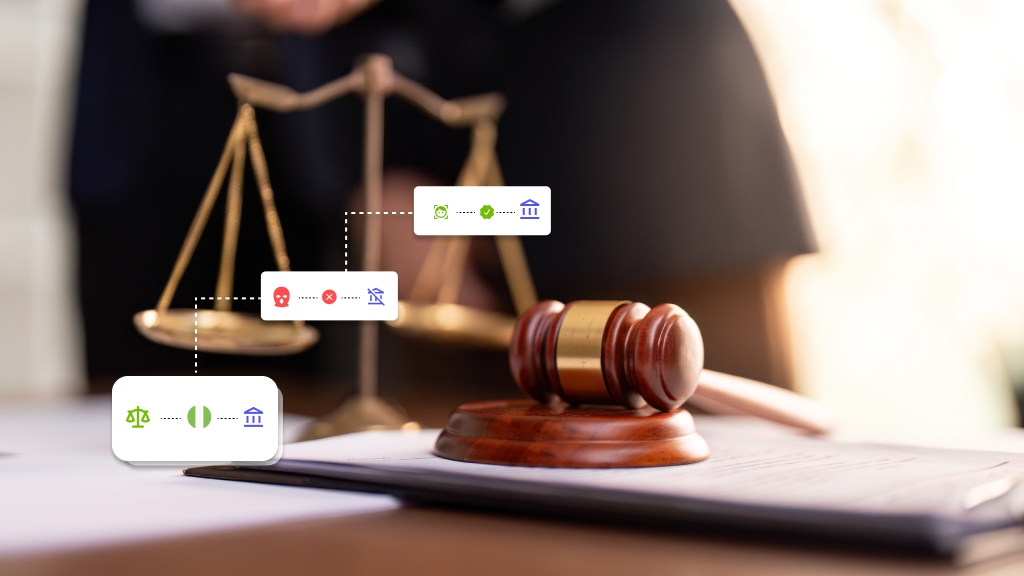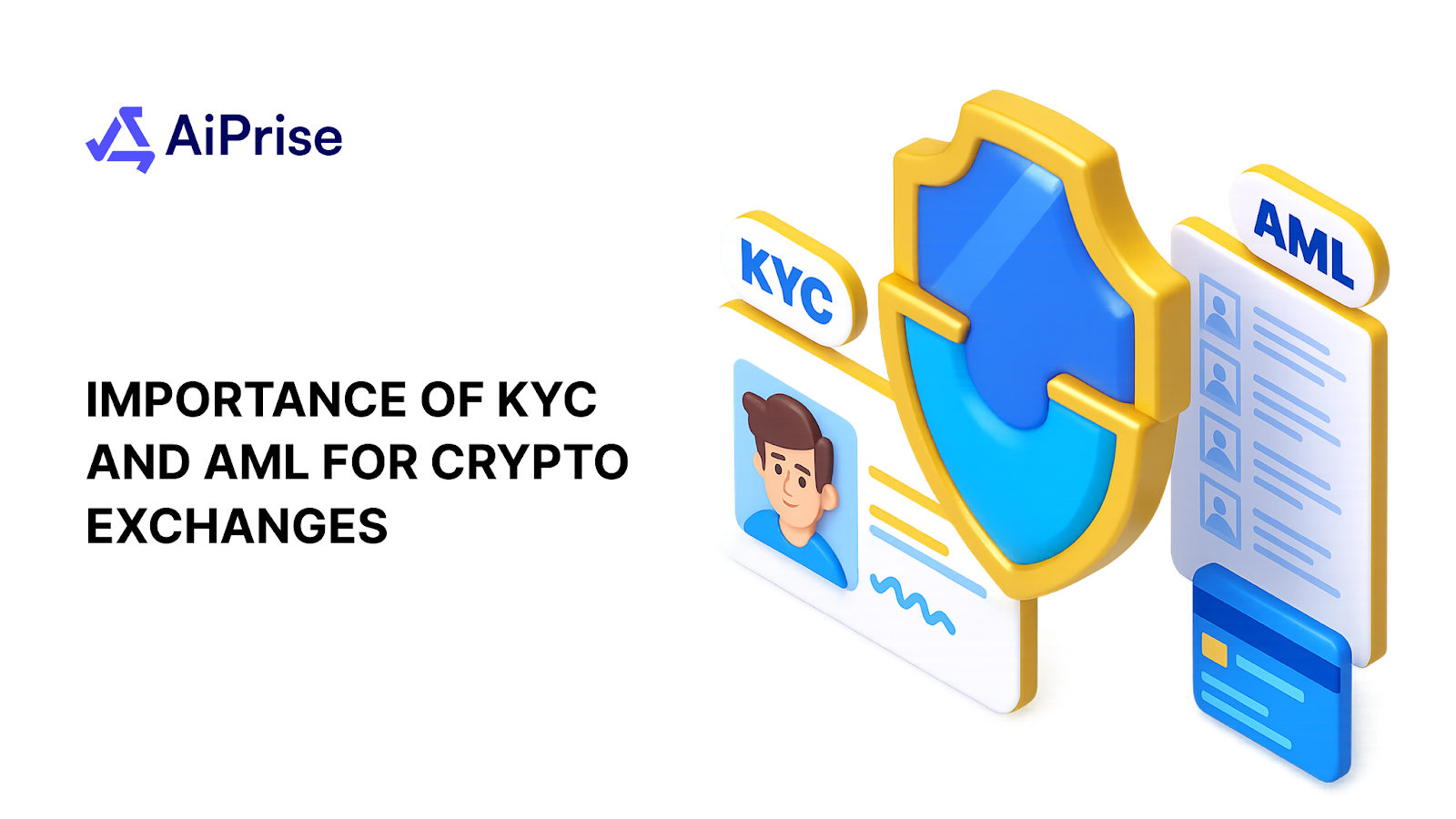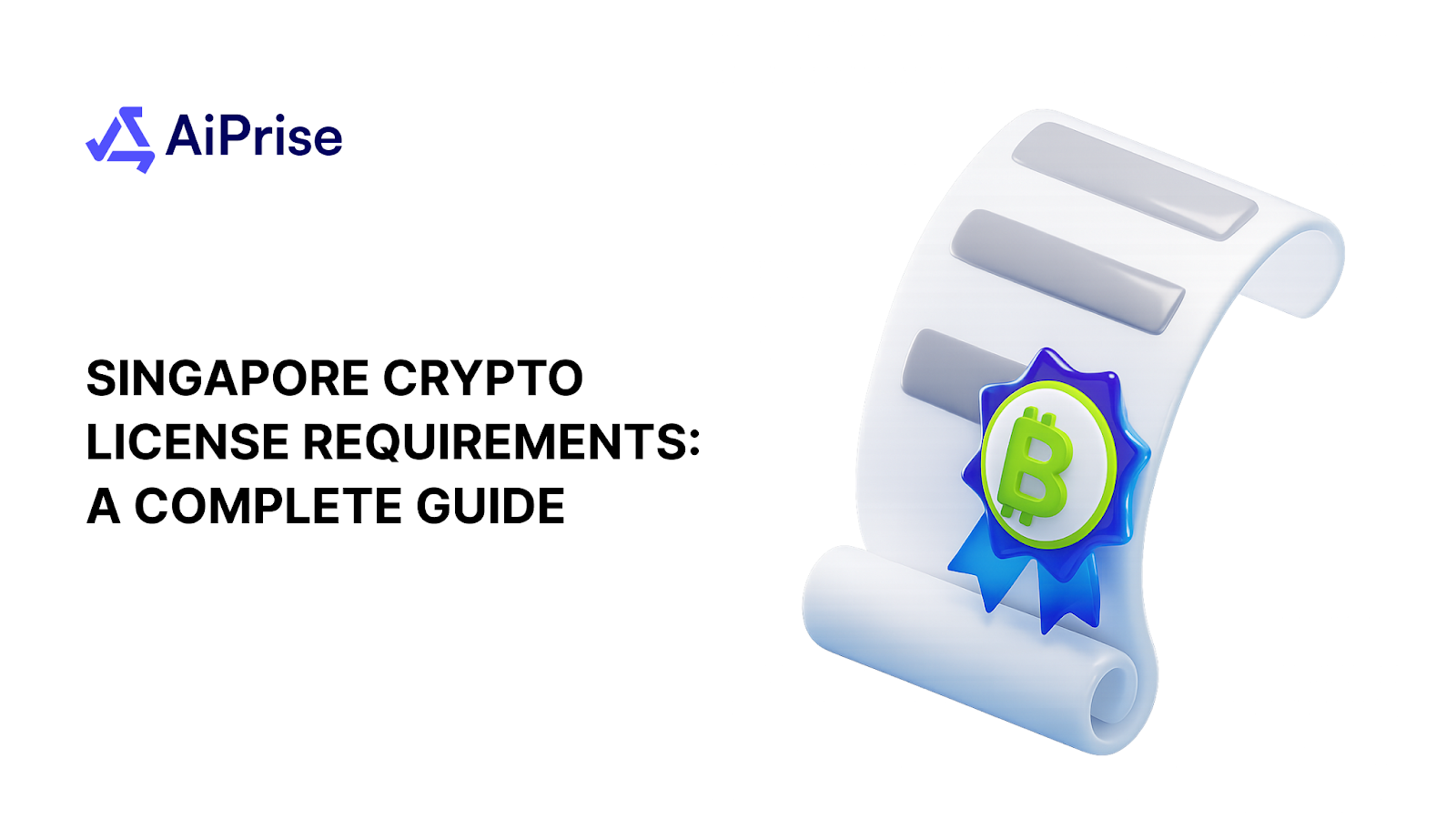AiPrise
16 mins read
July 22, 2025
Thailand Company Registration: Your Guide to Compliance

Key Takeaways










Thailand company registration has reached record levels, with 87,596 new businesses registered in 2024 and projections of up to 95,000 for 2025. This upward trend shows that more entrepreneurs, both local and foreign, see Thailand as a thriving market, underpinned by over $6.76 billion in foreign investment.
Knowing about Thailand company registration is essential if you want to access growing opportunities, ensure legal compliance, and build trust with customers and partners.
In this blog, you'll learn why proper company registration in Thailand matters, key benefits for your business, and practical steps to get started.
TL;DR
- Secure your unique company name early, and follow each registration step closely; missing any detail can halt your launch.
- Foreigners can achieve 100% ownership and unlock big tax benefits with BOI and Treaty of Amity options, but expect stricter capital and compliance rules.
- You’ll need two shareholders, one director, and a Thai business address, plus at least ฿100,000 in capital (locals) or ฿2,000,000 (most foreigners).
- Fast-track registration is possible in 1–2 days, but obtaining full operational status (including tax, VAT, and bank account) typically takes 2–3 weeks.
- Common roadblocks include rejected names, incomplete documents, or underfunded capital. Prepare thoroughly to avoid costly delays.
Why Company Registration is Important in Thailand
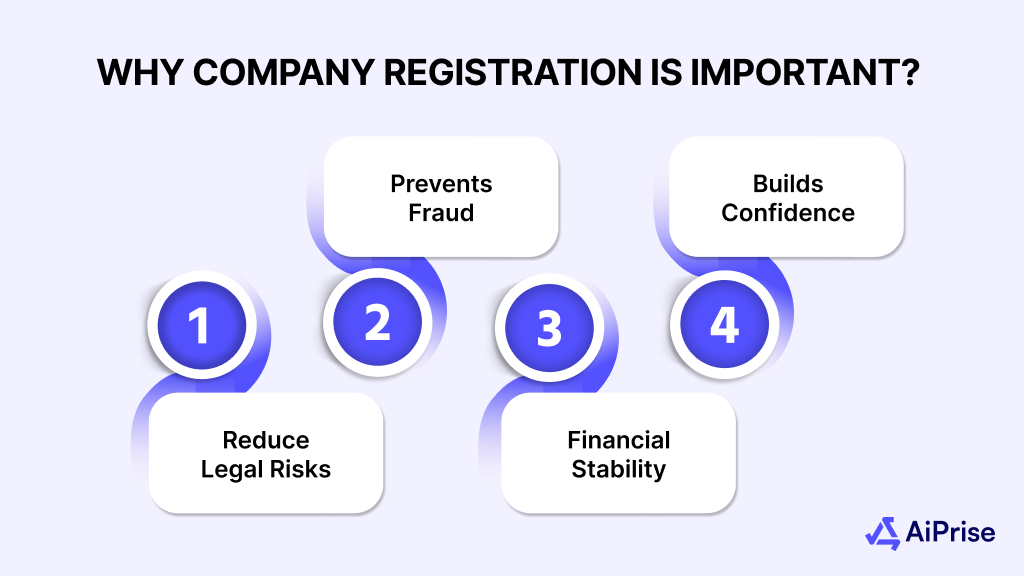
Before you sign any deal or send a payment, company registration and verification in Thailand act as your frontline defense against business risks. Skipping this crucial step can open you up to fraud, undisclosed liabilities, and regulatory penalties, especially in a market where corporate identities and ownership layers often change rapidly.
Whether you're a foreign entrepreneur or a local partner, thorough verification is necessary to safeguard your reputation, finances, and compliance in Thailand's diverse commercial environment.
When you register a company in Thailand, it helps in verification, and you protect your business and reputation by:
- Reducing Legal and Financial Risks: Unverified businesses can lack proper registration, operate without required licenses, or fail to comply with Thai regulations. This can lead to lost investments and penalties.
- Preventing Fraud and Scams: Verifying a company's directors, shareholders, and financial records helps you spot red flags like shell companies, identity concealment, or frequent leadership changes.
- Ensuring Financial Stability: Reviewing registration data and official filings (like the Certificate of Incorporation and financial statements) lets you assess whether a company is solvent and reliably capitalized before you sign contracts or send funds.
- Building Confidence and Trust: Clients, partners, and regulators are far more likely to trust your brand when you show you’ve performed due diligence on all business relationships in Thailand.
Before you understand how to do Thailand company registration, it’s critical to understand the different business entity options available. Your choice will shape everything from registration requirements to ownership limits and the incentives you can access, especially as a foreigner.
Thailand Company Registration: Structures & Essential Requirements
Before setting up operations, it’s essential to understand the major business entity choices in Thailand and the specific eligibility requirements for each. The structure you select will determine your liability, ownership options, and access to incentives, which will impact everything from compliance to your long-term profitability.
Next, let's break down the types of entities available so you can align your plans with both your objectives and local legal realities.
Types of Business Entities in Thailand
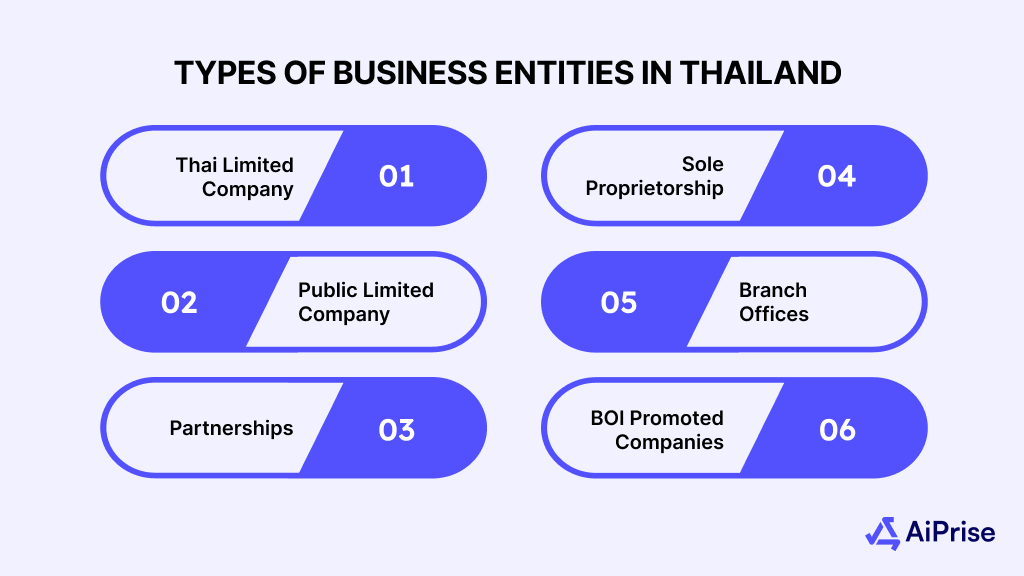
Thailand's business environment offers several entity types, each customized to different investment goals, liability needs, and growth strategies. Understanding their core differences helps you minimize risks and maximize efficiency from day one.
These business types include:
- Thai Limited Company (Private Limited Company)
- Most foreign investors choose this route for its straightforward setup and limited shareholder liability.
- Requires a minimum of three shareholders and at least one director.
- It can be entirely foreign-owned in some sectors, though restricted sectors require majority Thai participation or special licensing.
- Minimum capital starts at THB 2 million for most foreign-majority companies.
- Public Limited Company
- Suitable for larger ventures aiming for a stock exchange listing.
- Needs at least fifteen shareholders and a board of five directors (majority must be Thai residents).
- Heavier regulatory and financial disclosure requirements.
- Partnerships
- Unregistered Ordinary Partnership: Unlimited joint liability; treated as an individual for tax.
- Registered Ordinary Partnership: Separate legal entity; collective liability and corporate tax status.
- Limited Partnership: At least one general partner with unlimited liability and one or more limited partners.
- Sole Proprietorship
- Owned and operated by one person with unlimited liability.
- Less common for foreign investors due to personal financial risk.
- Representative and Branch Offices
- Branch Office: Can earn income and perform commercial operations; must comply with foreign capital requirements.
- Representative Office: Cannot generate revenue; limited to non-trading support tasks (e.g., quality control, sourcing).
- BOI (Board of Investment) Promoted Companies
- Designed for high-priority sectors (tech, export, R&D).
- Offer tax holidays, easier visa/work permit processes, and complete foreign ownership with the right approvals.
Now that you know your formation options, it's just as important to understand who qualifies, capital requirements, and key compliance basics before committing to any specific structure.
Prerequisites and Eligibility for Business Registration
These requirements determine if your preferred entity is feasible and if you can secure your targeted ownership share and sector access.
- Shareholder and Director Minimums
- Private Limited Company: At least three shareholders at all times and a minimum of one director.
- Public Limited Company: Fifteen shareholders, five directors (majority must reside in Thailand).
- Capital Requirements
- Minimum registered capital for most foreign-owned entities is THB 2 million; sector-specific or BOI-promoted businesses may require more for licensing or approval.
- Thai-owned or low-risk sector businesses may have reduced capital minimums.
- Ownership and Objectives
- The Foreign Business Act restricts the majority foreign ownership in many sectors unless special permission or BOI privileges are secured.
- Your business objectives must match the allowed (and promoted) activities for your selected entity type.
- Visa and Work Permit Basics (For Foreign Owners/Directors)
- Non-Thai directors or key shareholders generally require business visas and work permits.
- Your company must provide proof of registration, capital, and a business address to support these applications.
Choosing the right entity in Thailand sets the stage, but you also need a reliable process to confirm every company’s legitimacy before partnership, investment, or vendor engagement.
Steps to Verify a Thailand Company’s Registration
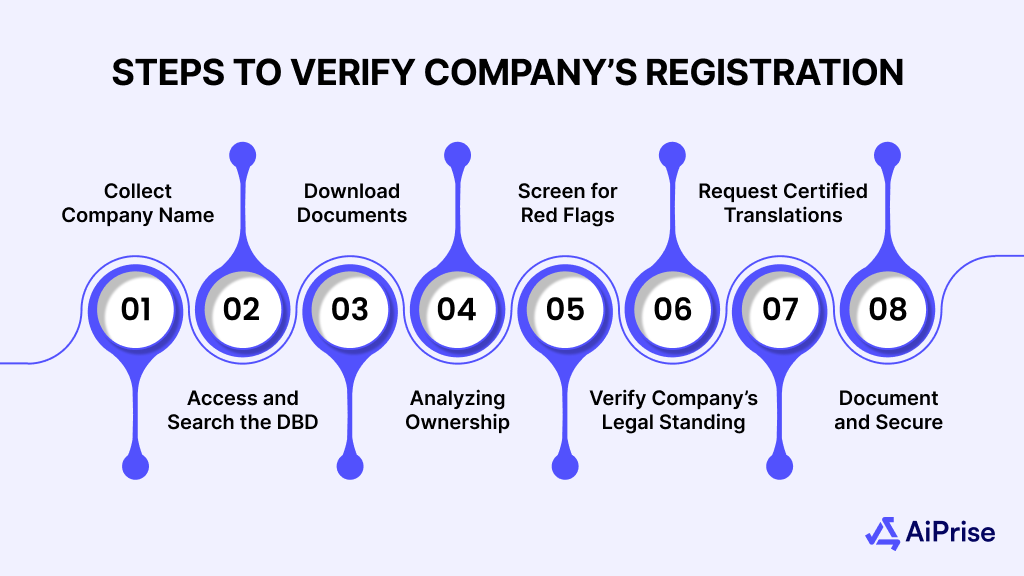
Once you’ve selected your business structure and ensured eligibility, the next step is to verify any Thai company’s registration for full compliance and peace of mind. Thanks to the 2026 rollout of the DBD Biz Regist platform, this process is now entirely digital, sharply reducing risk and paperwork for both local and foreign stakeholders.
Get started with these focused actions to confirm a Thai company’s official registration status using the most current tools:
Step 1. Collect the Official Thai Company Name
Always verify using the company’s legal name in Thai, as the Ministry of Commerce and the DBD Biz Regist system index all records in Thai script. This ensures precise results and prevents errors in your verification search.
Step 2. Access and Search the DBD Biz Regist Platform
Use the Department of Business Development’s (DBD) Biz Regist platform, the only official registry after January 2026, for all Thai companies. Input the legal Thai name to instantly access up-to-date data, including:
- Business registration number
- Current legal status (active, suspended, dissolved)
- Registered capital and official company address
- Incorporation date and list of authorized directors
Step 3. Download and Analyze All Corporate Documents
Retrieve and review original, digitally certified documents such as:
- Certificate of Incorporation confirms that the business is legally established.
- The Memorandum of Association (MoA) outlines the objectives, shareholding structure, and initial capital.
- Up-to-date shareholder and director lists.
- Business objectives, scope, and (when available) audited financial statements.
Step 4. Analyzing Ownership and Key Personnel
- Examine recent and historical shareholder lists, paying attention to unexplained changes, nominee patterns, or any proxies. Determine if directors or majority shareholders have shifted frequently; these are classic red flags for unstable or non-transparent operations.
Step 5. Screen for Ultimate Beneficial Owners (UBO) and Compliance Red Flags
Use structured tracing or digital compliance tools to map ownership layers and flag the actual, controlling UBOs.
- Run automated checks for all directors and shareholders against the global.
- Anti-money laundering (AML) watchlists.
- Politically Exposed Persons (PEP) databases.
- International sanctions or adverse media hits.
Step 6. Verify the Company’s Legal Standing
Confirm “active” status and absence of ongoing or unresolved legal, financial, or regulatory actions via the DBD system, which flags entities under investigation, subject to dissolution, or facing compliance issues.
Step 7. Request Certified Translations for Non-Thai Audiences
As all documents on the DBD portal are in Thai, order certified translations when presenting these records to foreign stakeholders or for multinational compliance audits. This ensures clarity and legal defensibility across jurisdictions.
Step 8. Document and Secure Every Step of Your Verification
Maintain a digital audit trail: download and securely archive each document, translation, and verification note internally. This record proves your thorough due diligence if issues ever arise.
Once you’ve verified a company’s legitimacy and decided to proceed with registration, it’s crucial to understand the full cost structure.
Costs Involved in Thailand Company Registration
Setting up a company in Thailand involves a combination of government fees, possible legal or consulting charges, and minimum capital deposits. Proper budgeting ensures a smooth, compliant registration and provides a solid foundation for operations.
Here’s a typical cost breakdown:
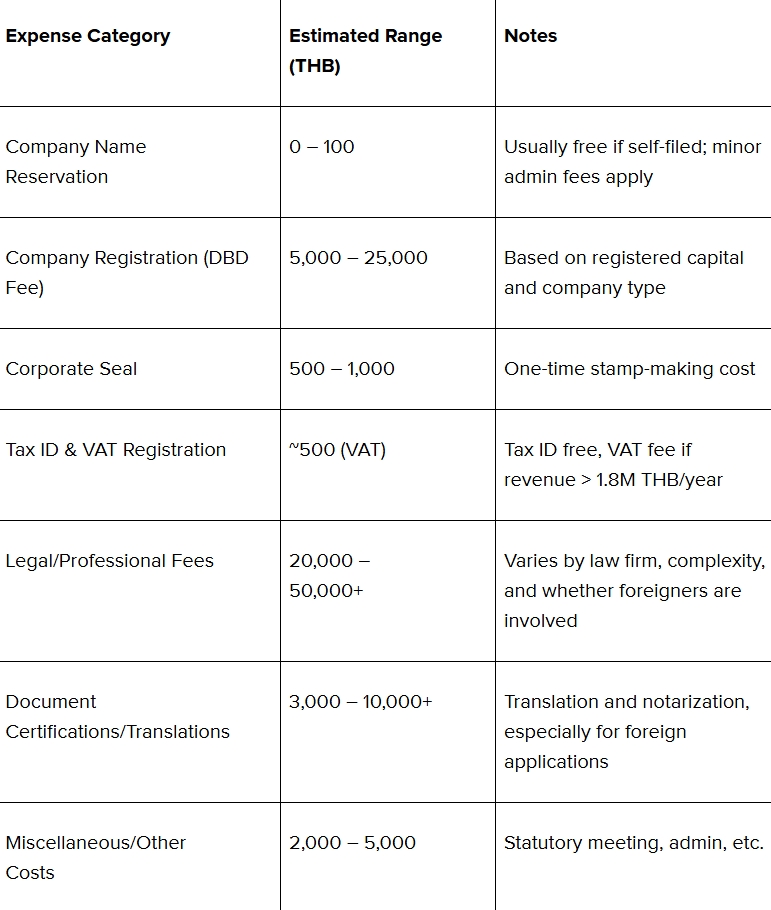
Note: All amounts are typical for standard Thai Limited Company formation as of 2025; larger ventures or public companies often incur higher fees.
After planning for costs, the last major hurdle is sidestepping the common errors that can stall or even derail your company registration.
Thailand Company Registration: Common Challenges and Mistakes to Avoid
Registering a company in Thailand can be rewarding but involves numerous technical and regulatory hurdles. Entrepreneurs often face delays or rejections due to naming conflicts, incomplete documentation, misunderstood compliance obligations, or banking and tax setup issues.
Here are common registration challenges in Thailand along with their actionable solutions:
Naming Issues
- Choosing a name that resembles an existing business or violates DBD naming guidelines leads to instant rejection and rework delays.
- Solution:
- Research existing company names in the DBD database before submission.
- Prepare three unique name options, ensuring they comply with required suffixes (such as “Limited”) and guidelines in both Thai and English.
- Reserve your preferred name online and await approval before preparing incorporation documents.
Documentation Errors
- Incomplete forms, inconsistent Memorandum of Association details, missing translations, or unsigned sections commonly cause delays and rejected filings.
- Solution:
- Double-check every field on all forms; match details (names, capital, address) precisely across all documents.
- Use a step-by-step checklist to confirm the inclusion of shareholder lists, Articles of Association, and tax documents.
Banking and VAT Hurdles
- Trouble opening a corporate account often stems from mismatched document details or missing information. Late VAT registration (mandatory if revenue > 1.8 million THB/year) leads to penalties.
- Solution:
- Confirm all company registration paperwork aligns with the requirements of your chosen bank. Have the director available in person, if required.
- Track your business revenues closely: pre-register for VAT if you expect early growth or need a work permit. Submit VAT documents within 60 days of reaching the revenue threshold.
Regulatory Deadline Failures
- Missing statutory meetings, late company filings, or overdue VAT registration can result in legal fines and disrupt operations.
- Solution:
- Set up reminders for key dates: statutory meeting within 3 months of formation, company registration within 14 days after, and VAT/tax filings as required.
- Use a Thai corporate services firm or automated e-reminder tools to help monitor and meet all critical deadlines.
Ignoring Legal and Local Expertise
- Foreign founders often overlook key local laws, language barriers, or required permits by not working with experienced Thai counsel.
- Solution:
- Engage a reputable Thai legal professional early in the process. They can anticipate hidden requirements (like digital identity verification or required supporting documentation in Thai) and speed up setup.
- Rely on local experts to bridge language gaps and assist with compliance, filings, and ongoing regulatory updates.
After highlighting registration challenges, it’s equally important to consider the serious consequences of failing to conduct proper company verification before conducting business in Thailand.
The Impact of Not Verifying and Registering a Company Before Doing Business
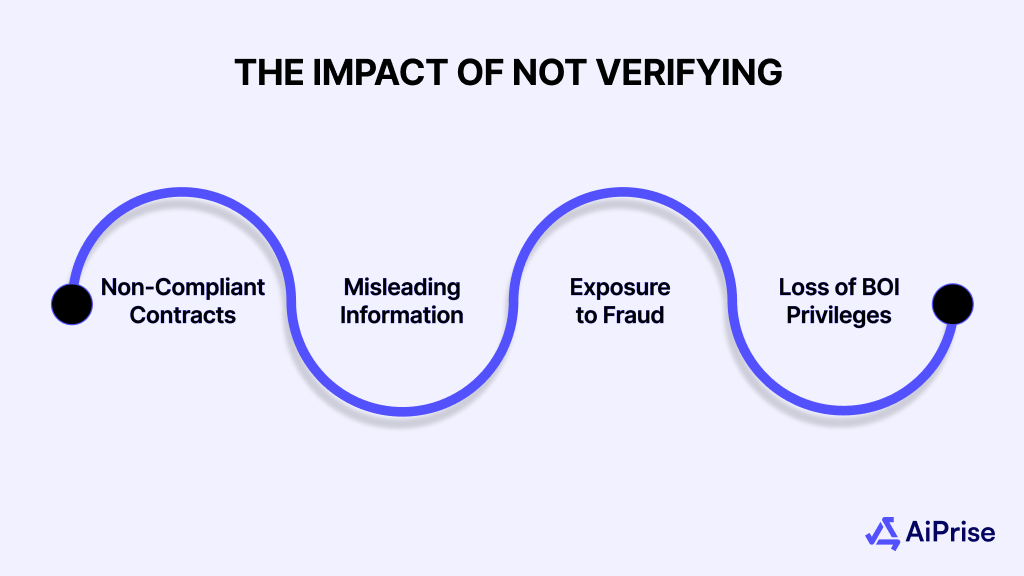
Failing to register a company in Thailand exposes your business to significant legal, financial, and operational risks. Many firms that appear legitimate on paper may conceal compliance issues, liabilities, or even fraudulent activities, making verification through official channels and supporting documentation essential for protecting your interests.
Failing to verify a company's registration and compliance status can expose your business to several risks:
- Engaging in Contracts with Non-Compliant Entities: You may inadvertently enter agreements with companies that lack proper registration, operate through shell or virtual fronts. This can lead to unenforceable contracts, sudden business shutdowns, or regulatory penalties for your own company.
- Liability for False or Misleading Information: If you rely on inaccurate company affidavits or documents, you risk participating in transactions with falsified data. Thai law (Penal Code Sections 137 and 267) holds directors and counterparties liable for involvement in falsification, with penalties including criminal charges and fines.
- Exposure to Fraud and Money Laundering: Regulatory bodies now mandate stricter in-person verifications and document scrutiny due to a rise in fraudulent companies exploiting corporate structures for illicit activities and money laundering. Non-compliance can trigger investigations, business suspensions, and asset freezes.
- Loss of BOI Privileges and Work Permit Barriers: For BOI-promoted companies, submitting false or unverifiable documentation leads to loss of system access for hiring expatriates and permanent disqualification from investment incentives.
Before you move ahead with Thailand company registration, let’s see how AiPrise can improve the registration process by closing critical gaps in document management, compliance, and transparency.
How AiPrise Can Help with Company Registration in Thailand?
AiPrise is purpose-built to address the complexities of Thai company registration, especially for businesses needing rigorous Know Your Business (KYB) checks and global compliance.
Here’s how AiPrise delivers precise, actionable value in this process:
- AI-Driven Risk Assessment: AiPrise uses advanced algorithms to examine fraud risks and identify potential threats before engaging in business transactions.
- Ultimate Beneficial Ownership (UBO) and Stakeholder Mapping: AiPrise traces and verifies UBOs by mapping ownership layers and screening all officers and stakeholders against international AML, PEP, and sanctions watchlists.
- AML and Data Protection: The platform ensures full compliance with Anti-Money Laundering (AML) regulations, helping businesses remain aligned with evolving legal requirements.
AiPrise makes Thai company registration faster, safer, and globally compliant by automating the retrieval and translation of legal documents and integrating seamlessly with both Thai and global KYB sources.
Wrapping Up
Thoroughly verifying and correctly registering your company in Thailand is essential to managing the country’s unique legal and regulatory environment while minimizing risks. Using advanced tools like AiPrise streamlines this process by ensuring accurate compliance, transparent ownership structures, and audit-ready documentation.
Take action today. Begin your registration journey with a comprehensive verification. Book a Demo with AiPrise today to secure your business foundation and confidently seize Thailand’s growing market opportunities.
FAQs
1. Can foreign nationals use nominee shareholders to meet Thai ownership requirements?
Nominee shareholders may be used informally, but this practice is legally risky and increasingly scrutinized by Thai authorities. For full compliance and to avoid penalties, foreigners should seek BOI promotion or structure ownership in approved ways rather than rely on nominees.
2. What are the consequences of not holding the statutory meeting within the required timeframe?
Failing to hold the statutory meeting within three months of filing the Memorandum of Association can delay registration and trigger fines. This meeting is mandatory to adopt bylaws and appoint directors; without it, the Department of Business Development will not process your registration.
3. Is it mandatory to have a local registered office address in Thailand?
Yes. Thai law requires companies to have a registered office address within Thailand, which must be declared during registration. This address serves as the official communication point for government agencies and legal notices.
4. Can a foreigner be the sole director of a Thai private limited company?
Technically, yes, but for operational reasons and visa/work permit approvals, it is advisable to have at least one Thai resident director. Many banks and authorities require a local director as part of due diligence and regulatory compliance.
5. How long does it typically take to receive a company registration certificate after submitting all documents?
Under the new DBD Biz Regist system launched in July 2025, the registration process typically completes within 1 to 5 business days, depending on the accuracy of submissions and whether additional information is requested. Paper filings are no longer accepted.
You might want to read these...

AiPrise’s data coverage and AI agents were the deciding factors for us. They’ve made our onboarding 80% faster. It is also a very intuitive platform.





Speed Up Your Compliance by 10x
Automate your compliance processes with AiPrise and focus on growing your business.








